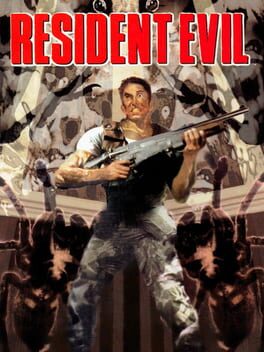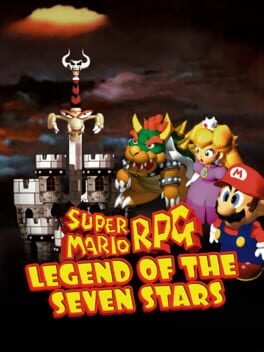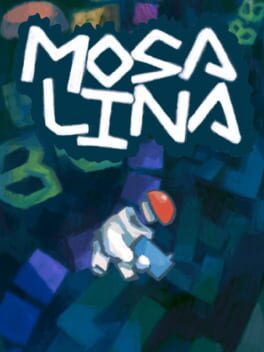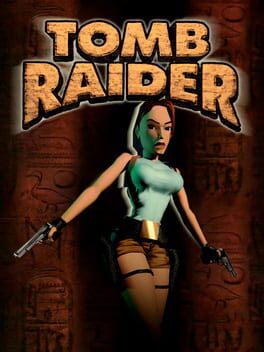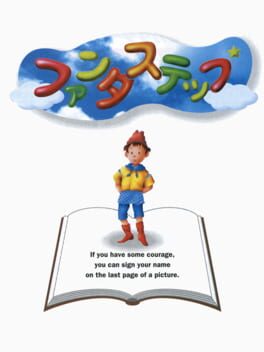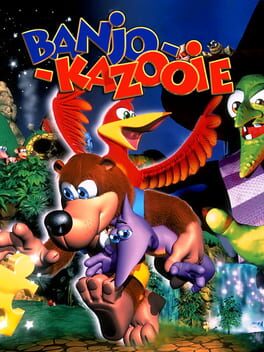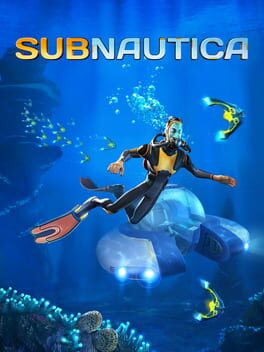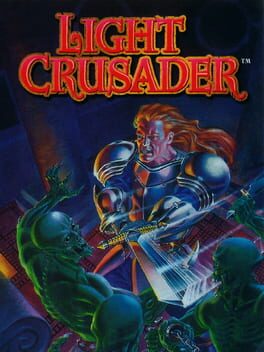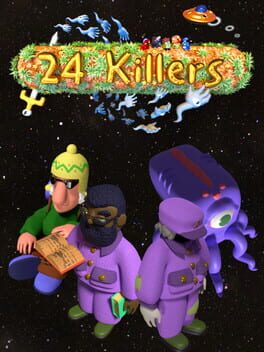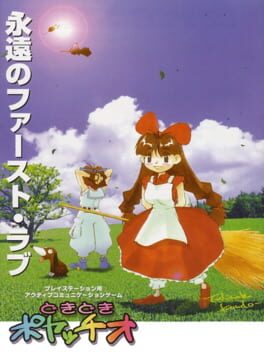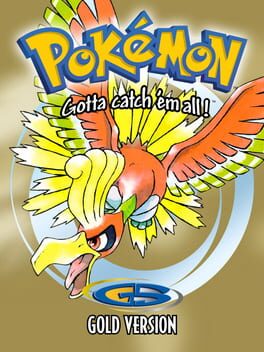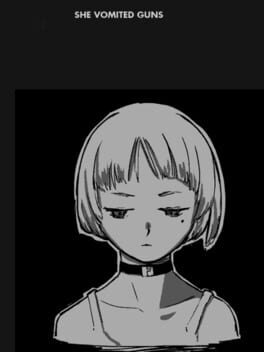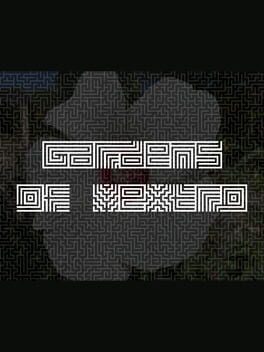MelosHanTani
BACKER
1996
forgot to log this. played a few hours this year. I found it hard to get into (repeating stuff when you die... the slow menu transitions lol.. they have a certain charm but get pretty grating)
but I really admire the way it has such a b-movie feel to it, but also how each individual room/combat/weird puzzle idea feels like a little vignette of its own. Maybe I'll come back some day! Or just move on to RE2...
but I really admire the way it has such a b-movie feel to it, but also how each individual room/combat/weird puzzle idea feels like a little vignette of its own. Maybe I'll come back some day! Or just move on to RE2...
1993
One of my earliest memories of this was renting it, loading up a save file at the last boss and letting the music loop. It's interesting - "Fight Against Smithy, Who Likes Transforming", is arguably a sped-up techno-influenced song (try slowing it to 75% speed), in the way that Kirby Super Star's Cocoa Cave is. I feel like that kind of stylized experimentation is getting rarer amongst game music nowadays, sadly... but that aside!
I replayed a lot of this last year. There's nothing really to the battle system, and it does feel dull after a while, but overlooking that, the pacing of the game's dungeons and scenarios feels breezy despite the 10+ hour playtime.
The story is serviceable, the subversion on Bowser's character is amusing, as is Mallow's arc. Mario's gestures are humorous, making great use of the limited visual vocabulary they had. But depth isn't really the point... it's just a very chill, cozy game to hang out in with some great art direction. The small details with the hotel, bizarre minigames that lead you to new areas, those details all work great here without feeling like they slow the pacing.
You can see a lot of this design thinking in future paper mario games - Origami King comes to mind. But I feel like those games are hampered by slower pacing, and some kind of restrain on creative control (endless Toads).
The influence of future love-de-lic (and alphadream) members is noticeable here in the game's eccentricities. I think it's a great testament to how letting AAA games be a little weird can actually lead to other interesting games down the line!
I replayed a lot of this last year. There's nothing really to the battle system, and it does feel dull after a while, but overlooking that, the pacing of the game's dungeons and scenarios feels breezy despite the 10+ hour playtime.
The story is serviceable, the subversion on Bowser's character is amusing, as is Mallow's arc. Mario's gestures are humorous, making great use of the limited visual vocabulary they had. But depth isn't really the point... it's just a very chill, cozy game to hang out in with some great art direction. The small details with the hotel, bizarre minigames that lead you to new areas, those details all work great here without feeling like they slow the pacing.
You can see a lot of this design thinking in future paper mario games - Origami King comes to mind. But I feel like those games are hampered by slower pacing, and some kind of restrain on creative control (endless Toads).
The influence of future love-de-lic (and alphadream) members is noticeable here in the game's eccentricities. I think it's a great testament to how letting AAA games be a little weird can actually lead to other interesting games down the line!
1986
The old people being scattered in caves is surprisingly humorous!
I'm not sure I have much new to add here. (I played through most of Level 1-6 and got kind of bored) I like the idea of the levels increasingly feeling soft gate-y and requiring you to try and find the Blue Ring, or the sword upgrades. I feel like if you made it easier to get money +find the heart containers (maybe hide them in mini challenge levels? Or why not do away with the idea of heart containers at all and gate the sword upgrades with triforce pieces?), and fixed up the messed up combat controls, and were more generous in healing you after death - this game is nearly playable without a guide and that's pretty cool for 1986. And in the cases where you do need hints (for me, finding money for the blue ring, and opening Level 7), it doesn't feel like it's ruining the whole experience.
Nearly 40 years on, I'm mostly surprised they haven't tried to remaster or redesign it (I guess there's that SNES version?). The enemy types are varied/fun, but the controls just aren't up to the task. (In some ways this game feels kinda rushed, especially in the dungeon room layouts which become tedious/drawn out, but Nintendo did a good job hiding the rushed-ness overall). I think the main reason is that with its lack of characters, it wouldn't sell well (compare to the character-driven stuff of the later 3D Zeldas). Unless they added some characters? The game gets tiring by the midpoint where you've seen most of the overworld and all that's left are a handful of samey-feeling but increasingly ridiculous enemy layout dungeons.
If I have one complaint, compared to other games around the time, Hyrule's art direction is pretty boring in the dungeons. Not really much sense of a level or place in those dungeons... just rooms stuck to each other. And there's only two songs...? This game is nearly unplayable with sound on, even though the overworld theme is cool (until it's looped the 100th time)
The overworld art direction is also a little so-so for the time (maybe it's the NES's fault), but the overworld has a good sense of geography so it sort of works.
I'm not sure I have much new to add here. (I played through most of Level 1-6 and got kind of bored) I like the idea of the levels increasingly feeling soft gate-y and requiring you to try and find the Blue Ring, or the sword upgrades. I feel like if you made it easier to get money +find the heart containers (maybe hide them in mini challenge levels? Or why not do away with the idea of heart containers at all and gate the sword upgrades with triforce pieces?), and fixed up the messed up combat controls, and were more generous in healing you after death - this game is nearly playable without a guide and that's pretty cool for 1986. And in the cases where you do need hints (for me, finding money for the blue ring, and opening Level 7), it doesn't feel like it's ruining the whole experience.
Nearly 40 years on, I'm mostly surprised they haven't tried to remaster or redesign it (I guess there's that SNES version?). The enemy types are varied/fun, but the controls just aren't up to the task. (In some ways this game feels kinda rushed, especially in the dungeon room layouts which become tedious/drawn out, but Nintendo did a good job hiding the rushed-ness overall). I think the main reason is that with its lack of characters, it wouldn't sell well (compare to the character-driven stuff of the later 3D Zeldas). Unless they added some characters? The game gets tiring by the midpoint where you've seen most of the overworld and all that's left are a handful of samey-feeling but increasingly ridiculous enemy layout dungeons.
If I have one complaint, compared to other games around the time, Hyrule's art direction is pretty boring in the dungeons. Not really much sense of a level or place in those dungeons... just rooms stuck to each other. And there's only two songs...? This game is nearly unplayable with sound on, even though the overworld theme is cool (until it's looped the 100th time)
The overworld art direction is also a little so-so for the time (maybe it's the NES's fault), but the overworld has a good sense of geography so it sort of works.
2023
I don't really get into sandbox-y games, usually because they expect long play sessions or learning a large bank of knowledge... and I want to be done with a game after 4-5 (maybe 8-10) hours rather than 'just getting started!'
But this sandbox-y platormer game centers physics-based 2D platforming, and the items you're given to clear levels are randomized and you're basically left to try and solve an open-ended puzzle with your toolkit of fish and boxes.
If you get stuck in Mosa Lina, you probably just die or try again with different items. So even though it looks like apuzzle platformer, it's not a 'pure puzzler' with designed solutions, which I'm not usually that into unless the puzzles are in service of something else (e.g. platforming puzzles in a story-focused game or something)
In Mosa Lina, with each cleared stage you're learning a little bit about whatever tool you used and maybe some object in the environment. So there's an interesting sense of growth, but instead, trying to solve a single level, you can just give up and try with a different set of 3 items.
The game is still sandbox-y though, it expects you to make your own experience. Sometimes the items you get are pretty ill-suited to some of the challenges, and you have to be okay with resetting.
That being said I find it's well-balanced overall and an amazing achievement. Even with a bad hand it seems like if I just keep dying/trying enough I can eventually get a roll that'll let me clear it, with enough ingenuity. Definitely a game I'll be thinking about and even coming back to for a while!
-
My only real complaint is that the hitboxes of the spikes is a bit fiddly. They feel a lot bigger than they look and I find a lot of my deaths to them to be a little unsatisfying - either from failing to clear a jump by a pixel, my foot slipping, etc...
But this sandbox-y platormer game centers physics-based 2D platforming, and the items you're given to clear levels are randomized and you're basically left to try and solve an open-ended puzzle with your toolkit of fish and boxes.
If you get stuck in Mosa Lina, you probably just die or try again with different items. So even though it looks like apuzzle platformer, it's not a 'pure puzzler' with designed solutions, which I'm not usually that into unless the puzzles are in service of something else (e.g. platforming puzzles in a story-focused game or something)
In Mosa Lina, with each cleared stage you're learning a little bit about whatever tool you used and maybe some object in the environment. So there's an interesting sense of growth, but instead, trying to solve a single level, you can just give up and try with a different set of 3 items.
The game is still sandbox-y though, it expects you to make your own experience. Sometimes the items you get are pretty ill-suited to some of the challenges, and you have to be okay with resetting.
That being said I find it's well-balanced overall and an amazing achievement. Even with a bad hand it seems like if I just keep dying/trying enough I can eventually get a roll that'll let me clear it, with enough ingenuity. Definitely a game I'll be thinking about and even coming back to for a while!
-
My only real complaint is that the hitboxes of the spikes is a bit fiddly. They feel a lot bigger than they look and I find a lot of my deaths to them to be a little unsatisfying - either from failing to clear a jump by a pixel, my foot slipping, etc...
1996
I actually find this pretty compelling, almost relaxing. Played 2.5 stages.
The art and ambience in particular is stunning, I love the use of light and vegetation. Spatially it's like this minimalist take on early FPS shooters... the secrets, the weird score popup at the end of levels. The lack of HUD elements in gameplay and minimal save points, no guidance is really nice.
That being said! The controls are really really bad - and I don't mean the precision and slow pacing, which I think are unique and valuable, but like there's just so much bumping into walls and doing these huge moves I don't expect her to do. It's just a level too unpleasant for the vibe they're going for.
The price for dying or slipping is pretty severe (being set back minutes of tedious traversal).
But if you ignore that what you have is a really interesting 3D platformer that's all about reading the environment. It really feels 'adventure-y', although I can't help but wish for something that was a bit more compelling conceptually other than raiding ancient ruins one after another.
The art and ambience in particular is stunning, I love the use of light and vegetation. Spatially it's like this minimalist take on early FPS shooters... the secrets, the weird score popup at the end of levels. The lack of HUD elements in gameplay and minimal save points, no guidance is really nice.
That being said! The controls are really really bad - and I don't mean the precision and slow pacing, which I think are unique and valuable, but like there's just so much bumping into walls and doing these huge moves I don't expect her to do. It's just a level too unpleasant for the vibe they're going for.
The price for dying or slipping is pretty severe (being set back minutes of tedious traversal).
But if you ignore that what you have is a really interesting 3D platformer that's all about reading the environment. It really feels 'adventure-y', although I can't help but wish for something that was a bit more compelling conceptually other than raiding ancient ruins one after another.
1997
Visually this game is very pretty - lots of early 3D spaces, interesting color palettes, especially the overworlds. I played the first hour here: https://www.youtube.com/watch?v=cxhU8zYErJ8
(Here's a full Japanese Let's play https://www.youtube.com/watch?v=jexo53nqjHI&list=PLYGbdsIp2Ktrw9Y2ula58B1u7yrNXfHV2&index=1 )
The game uses 2D sprites in 3D areas to neat effect, I love the cactus towers (sabokuri), and it was fun to see what areas each new kingdom held.
The writing was... pretty bare bones. The arcs in each kingdom feel sort of like a broken JRPG - you might stick a thorn into a train to slow it down. Or rescue a clan of chickens from an invasion. Or fix a rainbow bridge by finding 7 items, or help a marriage that's going to go wrong... most of the time it's fairly unremarkable, but occasionally some situations are surreal and unique - a guesthouse owner in the middle of a jungle, with a single guest - a man who can't wake up. Other humans trapped in the storybook, forced to work as clowns forever.
Due to how the game works, it's possible to miss entire kingdoms based on very unnoticeable decisions (I did). I might do a playthrough again to see those areas. Which leads to my next point - as an adventure game Fantastep... sucks lol. Puzzle solutions range from obvious to impossible to guess (one involves you having to return to the same room 5 or 6 times to find a different clue in the same spot). At one point I beat the final boss before saving each kingdom, and it set flags in such a way that some kingdom's quests were automatically completed. It's possible to miss items to complete quests! The game requires you to find 5 flower rings. The game actually has 7 or 8, relying on clues from hidden fairies to decipher which are the ones you want to use. I used the wrong rings and got the bad ending, but at that point I was locked out of the good end, and didn't really care...
Overall a pretty rough game with some great art and music. I really like the strange storybook fantasy atmosphere, even if it's roughly and poorly rendered. Definitely makes me want to check out similar vibe games from the mid/late 90s, like Napple Tale.
(Here's a full Japanese Let's play https://www.youtube.com/watch?v=jexo53nqjHI&list=PLYGbdsIp2Ktrw9Y2ula58B1u7yrNXfHV2&index=1 )
The game uses 2D sprites in 3D areas to neat effect, I love the cactus towers (sabokuri), and it was fun to see what areas each new kingdom held.
The writing was... pretty bare bones. The arcs in each kingdom feel sort of like a broken JRPG - you might stick a thorn into a train to slow it down. Or rescue a clan of chickens from an invasion. Or fix a rainbow bridge by finding 7 items, or help a marriage that's going to go wrong... most of the time it's fairly unremarkable, but occasionally some situations are surreal and unique - a guesthouse owner in the middle of a jungle, with a single guest - a man who can't wake up. Other humans trapped in the storybook, forced to work as clowns forever.
Due to how the game works, it's possible to miss entire kingdoms based on very unnoticeable decisions (I did). I might do a playthrough again to see those areas. Which leads to my next point - as an adventure game Fantastep... sucks lol. Puzzle solutions range from obvious to impossible to guess (one involves you having to return to the same room 5 or 6 times to find a different clue in the same spot). At one point I beat the final boss before saving each kingdom, and it set flags in such a way that some kingdom's quests were automatically completed. It's possible to miss items to complete quests! The game requires you to find 5 flower rings. The game actually has 7 or 8, relying on clues from hidden fairies to decipher which are the ones you want to use. I used the wrong rings and got the bad ending, but at that point I was locked out of the good end, and didn't really care...
Overall a pretty rough game with some great art and music. I really like the strange storybook fantasy atmosphere, even if it's roughly and poorly rendered. Definitely makes me want to check out similar vibe games from the mid/late 90s, like Napple Tale.
1998
I wrote about this game a few years ago, idk if I agree with everything but it might be interesting: https://meloshantani.wordpress.com/2017/10/27/banjo2/
Last I played this (2017) I liked it! Good balance of levels that manage to stay navigable, reasonable # of goals and things to find, some fun revisiting with abilities, and the hub world's secrets are still neat. Some recent indie collectathons (like hat in time) feel like their movesets are too acrobatic, causing their levels to balloon confusingly in size by mashing together Super Mario 64 acrobatics-ism and Banjo-Kazooie-collecting-ism. The relative slowness of banjo works to the game's advantage, keeping them manageable. I think Banjo-Tooie had some problems with levels getting too big or having too many screen transitions.
The later levels in Banjo do get a bit unmanageable if you're trying to 100% notes, but outside of that goal it feels fun to learn about the levels and get around.
Last I played this (2017) I liked it! Good balance of levels that manage to stay navigable, reasonable # of goals and things to find, some fun revisiting with abilities, and the hub world's secrets are still neat. Some recent indie collectathons (like hat in time) feel like their movesets are too acrobatic, causing their levels to balloon confusingly in size by mashing together Super Mario 64 acrobatics-ism and Banjo-Kazooie-collecting-ism. The relative slowness of banjo works to the game's advantage, keeping them manageable. I think Banjo-Tooie had some problems with levels getting too big or having too many screen transitions.
The later levels in Banjo do get a bit unmanageable if you're trying to 100% notes, but outside of that goal it feels fun to learn about the levels and get around.
2018
The survival parts (thirst/hunger) feel a bit tacked on. Pretty quickly that entire system transforms into occasionally hoarding a few resources and cooking now and then, and health/oxygen already felt like they were doing enough for the survival aspect.
Exploration is fun - but scavenging for materials quickly grows tedious. The scavenging is fine when entering a new biome, but on the 3rd or 4th trip to go find Silver to craft some thing or another it's not that interesting. I like the idea of base building, but when I know it's predicated by walking around the ocean floor for an hour picking up scrap metal, it's hard to want to engage with.
The game is kind of relaxing otherwise. I think when you strip away all the excess you have a creative take on the metroidvania, dividing up an open sea into biomes feels really organic and neat. The dangerous sea animals worked well for a more tense atmosphere.
Overall it feels kind of bloated. Which maybe makes sense if it's been having updates for almost 10 years..? I know Early Access is a great marketing move, but I can't help but feel like when you let players design games you end up with bloated experiences (as the game starts to become a container for multiple peoples' desires rather than just a few designers).
Exploration is fun - but scavenging for materials quickly grows tedious. The scavenging is fine when entering a new biome, but on the 3rd or 4th trip to go find Silver to craft some thing or another it's not that interesting. I like the idea of base building, but when I know it's predicated by walking around the ocean floor for an hour picking up scrap metal, it's hard to want to engage with.
The game is kind of relaxing otherwise. I think when you strip away all the excess you have a creative take on the metroidvania, dividing up an open sea into biomes feels really organic and neat. The dangerous sea animals worked well for a more tense atmosphere.
Overall it feels kind of bloated. Which maybe makes sense if it's been having updates for almost 10 years..? I know Early Access is a great marketing move, but I can't help but feel like when you let players design games you end up with bloated experiences (as the game starts to become a container for multiple peoples' desires rather than just a few designers).
1995
spoilers!
If I had to name my favorite dungeon tropes in games, I think the 'multi-floor world-dungeon' would be one of them: where the space that you traverse downwards (or upwards) is tied to the story that's being told. Nepheshel and its descent into the abyss is a particularly breathtaking example, as is the indie game Slimes and its frightening slime-horror-cave. ... Usually this trope is within the turn-based RPG genre. Now in those two games cases, they're relatively short.
But in other cases - like dungeon crawlers like Etrian Odyssey, Undernauts, Nemuru Mayu, Labyrinth of Galleria, SMT Strange Journey etc, the games are very long! And at least in Undernauts/SMT (I haven't played much EO, Nemuru Mayu, or Galleria), things get more involved the farther you go in. You really have to love the time-consuming dungeon crawl to enjoy the 'spatial story'.
Well, that is to say, I really liked Light Crusader trying to marry action elements to the dungeon crawl RPG. If I'm being honest its actual action and puzzles are maybe a 3/5 at best, but the whole world set-up - explore 6 floors underneath a castle, each its own huge dungeon - was a lot of fun. Each floor reveals some new secrets and twists, and although the game's narrative never reaches exciting territory, it was still such a memorable and fun structure. Also there were great tunes and Treasure's pixel art is amazing!
(Yes, the same studio that made Ikaruga made this!)
The action, like other games of the era, suffer from enemies having poor tells for ridiculously fast attacks. This game is isometric fake-3D, meaning it's hard to line up or dodge or jump over things. Your attack hitbox is really small, too.
There's a real 'small-team' feel to the game. Little one-off jokes here and there which I won't spoil. The way the late game floor has you warp off into 8 different zones with completely different genre settings - Japanese rooms, warzones, future, etc - was surprising. Unfortunately I wish they had done something more interesting with that other than just let you visit briefly! But it was still a fun surprise.
The way everyone talks is brief and almost stilted, but in a way that suits the tone - it's a small, scary medieval town and everyone's getting kidnapped. Things seem to be in a panic..
Well, also, it's just a short game. I finished in like 4-5 hours! I miss that length. The game is just trying so much, and using all these fun ideas, that it's hard to not give it a 5. It's a game with very good Spirit.
If I had to name my favorite dungeon tropes in games, I think the 'multi-floor world-dungeon' would be one of them: where the space that you traverse downwards (or upwards) is tied to the story that's being told. Nepheshel and its descent into the abyss is a particularly breathtaking example, as is the indie game Slimes and its frightening slime-horror-cave. ... Usually this trope is within the turn-based RPG genre. Now in those two games cases, they're relatively short.
But in other cases - like dungeon crawlers like Etrian Odyssey, Undernauts, Nemuru Mayu, Labyrinth of Galleria, SMT Strange Journey etc, the games are very long! And at least in Undernauts/SMT (I haven't played much EO, Nemuru Mayu, or Galleria), things get more involved the farther you go in. You really have to love the time-consuming dungeon crawl to enjoy the 'spatial story'.
Well, that is to say, I really liked Light Crusader trying to marry action elements to the dungeon crawl RPG. If I'm being honest its actual action and puzzles are maybe a 3/5 at best, but the whole world set-up - explore 6 floors underneath a castle, each its own huge dungeon - was a lot of fun. Each floor reveals some new secrets and twists, and although the game's narrative never reaches exciting territory, it was still such a memorable and fun structure. Also there were great tunes and Treasure's pixel art is amazing!
(Yes, the same studio that made Ikaruga made this!)
The action, like other games of the era, suffer from enemies having poor tells for ridiculously fast attacks. This game is isometric fake-3D, meaning it's hard to line up or dodge or jump over things. Your attack hitbox is really small, too.
There's a real 'small-team' feel to the game. Little one-off jokes here and there which I won't spoil. The way the late game floor has you warp off into 8 different zones with completely different genre settings - Japanese rooms, warzones, future, etc - was surprising. Unfortunately I wish they had done something more interesting with that other than just let you visit briefly! But it was still a fun surprise.
The way everyone talks is brief and almost stilted, but in a way that suits the tone - it's a small, scary medieval town and everyone's getting kidnapped. Things seem to be in a panic..
Well, also, it's just a short game. I finished in like 4-5 hours! I miss that length. The game is just trying so much, and using all these fun ideas, that it's hard to not give it a 5. It's a game with very good Spirit.
2023
somehow i don't have this reviewed! the developer todd and I go way back to the early 2010s. i thought their early games like Chain Champ were cool.
following this game's evolution over that period has been fun, and I'm glad it turned out so well - a charming and personal adventure game with unique art, music, sense of place.
following this game's evolution over that period has been fun, and I'm glad it turned out so well - a charming and personal adventure game with unique art, music, sense of place.
A '90s PSX Life Sim I posted a song of on my music channel:
https://www.youtube.com/watch?v=msjpAsvJ5XU
JP-only, but great if you like life sims!
You play as a boy staying at his cousin's(?) bakery on a floating island for the summer. Each day you'll deliver bread to townspeople. Occasionally you can trigger events to get to know some of the girls better. It's typical genre fare, but feels less stiff than your harvest moon - characters all run around on their daily cycles and you often have to chase people down. Events trigger seemingly out of nowhere. It's confusing but works.
I like the game's lore. It's a floating island, but if you explore the tunnels below the surface you'll see distant ruins in chasms below you - out of reach... Complete with forboding music, this makes for some surprising atmosphere. I wasn't able to discover the lore behind it - alongside some suspicious/shifty characters - but I assumed that was all intentional. There are violent creatures in the outskirts of town, you can literally Die... some characters are witches with spooky cavern labs. it felt refreshing to be as in the dark as I presumed the villagers were, about the history of their island.
Certainly we can say the same is true of many of the places we live in. My hometown used to store missiles during the cold war, before that it was a training airfield for WW2... and today it's just soccer fields.
There's points to criticize in DDP but overall it's memorable and ultimately that's all I really care about. As you meet new characters and learn terms, you can ask other characters about other people, or the terms. Of course, most characters go "??? I don't know???" but on occasion you get a detailed response and it sheds light on some social relations of the character. Could've used a design pass or two but I appreciate it nonetheless.
https://www.youtube.com/watch?v=msjpAsvJ5XU
JP-only, but great if you like life sims!
You play as a boy staying at his cousin's(?) bakery on a floating island for the summer. Each day you'll deliver bread to townspeople. Occasionally you can trigger events to get to know some of the girls better. It's typical genre fare, but feels less stiff than your harvest moon - characters all run around on their daily cycles and you often have to chase people down. Events trigger seemingly out of nowhere. It's confusing but works.
I like the game's lore. It's a floating island, but if you explore the tunnels below the surface you'll see distant ruins in chasms below you - out of reach... Complete with forboding music, this makes for some surprising atmosphere. I wasn't able to discover the lore behind it - alongside some suspicious/shifty characters - but I assumed that was all intentional. There are violent creatures in the outskirts of town, you can literally Die... some characters are witches with spooky cavern labs. it felt refreshing to be as in the dark as I presumed the villagers were, about the history of their island.
Certainly we can say the same is true of many of the places we live in. My hometown used to store missiles during the cold war, before that it was a training airfield for WW2... and today it's just soccer fields.
There's points to criticize in DDP but overall it's memorable and ultimately that's all I really care about. As you meet new characters and learn terms, you can ask other characters about other people, or the terms. Of course, most characters go "??? I don't know???" but on occasion you get a detailed response and it sheds light on some social relations of the character. Could've used a design pass or two but I appreciate it nonetheless.
1999
Played up through the 7th badge (these games go by quick with 10x speedup!) I was actually surprised at my bad reaction to G/S: in my childhood mind, these were the best two games. Likewise, I was surprised how good R/B felt.
To my surprise, G/S feel a bit flat. The locations and landmarks feel more touristy than anything: rather than the way that R/B's world was a little denser and intertwined and felt like it was drawing on some kind of Japanese childhood/adulthood, G/S's map feels a bit more arbitrary with various 'tourist destinations' dropped in here and there, weirdly intertwined with Team Rocket and Rival stuff, scouring the maps for missed HMs. I appreciate the effort to tie real world history to the game, but it feels a bit dropped in - the mythology of pokemon themselves don't feel that tied to the systems - being a kid and getting badges, fighting pokemon.
The Radio, night/day, new balls, phone calls, etc - these are all new and sort of cute but they also don't feel super relevant to the main game based on what they amount to.
Overall there are still some nice moments: I liked the underground walkway with trainer fights this time! The way the northern/northwestern reaches of the map seem more steeped in forests and caves is an interesting contrast. Seeing regions guarded for cultural reasons (Dragon's Den guarded if you don't tame dragons, Tin Tower if you're missing a badge) - these border on interesting, but they still feel detached from the main character - a little kid who for some reason ends up catching Gods and taking down terrorists.
You can really see the pokemon formula start to take shape here: new pokemon, a new villain group, another kid who for some reason ascends to divinity-level strength against a world which contradictory..ly tries to stay grounded. A world obviously inspired by some real place, but that canonically refuses to be linked to that real place.
I have no doubt that some of the later games manage to balance the battles, complexity, and story better - but none of those things are really what made Red/Blue so interesting to begin with.
To my surprise, G/S feel a bit flat. The locations and landmarks feel more touristy than anything: rather than the way that R/B's world was a little denser and intertwined and felt like it was drawing on some kind of Japanese childhood/adulthood, G/S's map feels a bit more arbitrary with various 'tourist destinations' dropped in here and there, weirdly intertwined with Team Rocket and Rival stuff, scouring the maps for missed HMs. I appreciate the effort to tie real world history to the game, but it feels a bit dropped in - the mythology of pokemon themselves don't feel that tied to the systems - being a kid and getting badges, fighting pokemon.
The Radio, night/day, new balls, phone calls, etc - these are all new and sort of cute but they also don't feel super relevant to the main game based on what they amount to.
Overall there are still some nice moments: I liked the underground walkway with trainer fights this time! The way the northern/northwestern reaches of the map seem more steeped in forests and caves is an interesting contrast. Seeing regions guarded for cultural reasons (Dragon's Den guarded if you don't tame dragons, Tin Tower if you're missing a badge) - these border on interesting, but they still feel detached from the main character - a little kid who for some reason ends up catching Gods and taking down terrorists.
You can really see the pokemon formula start to take shape here: new pokemon, a new villain group, another kid who for some reason ascends to divinity-level strength against a world which contradictory..ly tries to stay grounded. A world obviously inspired by some real place, but that canonically refuses to be linked to that real place.
I have no doubt that some of the later games manage to balance the battles, complexity, and story better - but none of those things are really what made Red/Blue so interesting to begin with.
2023
A neat short visual novel. It creates a setting that's some kind of vaguely dark technofuture, lacking references to our real world that suspends it in something that feels a little like bits of 25th Ward, or BLAME! A girl is able to be grown via praise to create weapons, a scientist harnesses the power of a 4Chan message board and the mix of hate/love the users direct at girls (anime girls, etc), in order to more quickly grow the girl, eventually freeing her. Personally I've always been a little curious about the culture of some corners of the internet of people who seem young, are fairly aggressive, yet wear anime avatars or frequently consume extremely moe visual novels, anime, Japanese culture, etc.
This story was made pretty quickly and could go in various directions, but I liked how it connected certain 'real life topics' to these otherwise strange SF elements.
This story was made pretty quickly and could go in various directions, but I liked how it connected certain 'real life topics' to these otherwise strange SF elements.
2022
I loved this game! (And it's free!) It's an ordered collection of 8 games made by a group of friends, with the condition that each installment is influenced by the story of all previous games. In some ways it's sort of 'epic' in that sense - kind of like how all the stories of Live-a-live or something are related, or something...
It's cool to see the way each game makes use of similar motifs of the white flower, or spatial conceits like a labyrinth, but while expressing each creator's personalities.
Buried Flower - John Thyer - I liked how this built a sense of suspense and also violating whatever flower-grave you were delving into.
Labyrinths - lotus - A short visual novel about a house that slowly empties, their parents disappearing one by one, someone recalling memories of livelier times, also with a kind of sci-fi framing to it.
The Aleph Hustle - LeeRoy Lewin - This reminded me of click-to-move flash games, and with that minimal interaction set managed to convey strongly the sense of a looping and disturbing labyrinth. I won't spoil the twist...
Make Like A Tree - NARFNra - A charming/absurd dungeon crawler that has some neat formal tricks as well as a funny change in tone.
another reverie - saori - A thoughtful and mellow, yuri-inspired (I think) RPG Maker 2k3 aesthetic game that is set outside of a labyrinth, two protagonists who have just finished an adventure and are getting to know each other, revealing potent truths about themselves.
Wet Cemetery - nilson - A 'house-exploration' Twine game that explores someone's time or long history living with parents, relationship to gaming, and body image (and more)
Wellness Related Time - Zeloz Mk. II - Felt like a condensed distillation of Ryukishi07 magic-isms applied to this magical college campus setting. It's fun how it builds the skeleton of this deep magic system in the span of a short visual novel.
Pangea's Error - Sraëka-Lillian - A world map exploration RPG with a Brandish-like rotation gimmick! Learn of the history of a massive world while finding weapons strewn about. I haven't finished this one yet.
It's cool to see the way each game makes use of similar motifs of the white flower, or spatial conceits like a labyrinth, but while expressing each creator's personalities.
Buried Flower - John Thyer - I liked how this built a sense of suspense and also violating whatever flower-grave you were delving into.
Labyrinths - lotus - A short visual novel about a house that slowly empties, their parents disappearing one by one, someone recalling memories of livelier times, also with a kind of sci-fi framing to it.
The Aleph Hustle - LeeRoy Lewin - This reminded me of click-to-move flash games, and with that minimal interaction set managed to convey strongly the sense of a looping and disturbing labyrinth. I won't spoil the twist...
Make Like A Tree - NARFNra - A charming/absurd dungeon crawler that has some neat formal tricks as well as a funny change in tone.
another reverie - saori - A thoughtful and mellow, yuri-inspired (I think) RPG Maker 2k3 aesthetic game that is set outside of a labyrinth, two protagonists who have just finished an adventure and are getting to know each other, revealing potent truths about themselves.
Wet Cemetery - nilson - A 'house-exploration' Twine game that explores someone's time or long history living with parents, relationship to gaming, and body image (and more)
Wellness Related Time - Zeloz Mk. II - Felt like a condensed distillation of Ryukishi07 magic-isms applied to this magical college campus setting. It's fun how it builds the skeleton of this deep magic system in the span of a short visual novel.
Pangea's Error - Sraëka-Lillian - A world map exploration RPG with a Brandish-like rotation gimmick! Learn of the history of a massive world while finding weapons strewn about. I haven't finished this one yet.
